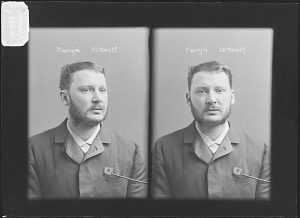I still remember a story Fr. Ron Thompson told me over 10 years ago. Fr. Ron is a friend of the actor Jim Caviezel, who played Jesus in The Passion of the Christ. During its filming in 2002, Fr. Ron was on set and talking to the director, Mel Gibson, who is a devout Catholic but known to have a troubled past. At the end of their conversation, Fr. Ron put his hands on Gibson’s shoulders and reassured him, ‘Mel, you’re not far from the Kingdom of God,’ which is what Jesus says in Mk 12:34 to one of the scribes who was open to hearing Him. And Gibson said, ‘Thank you, Father.’
I’ve always remembered that story because here you have this famous actor who needed affirmation from a spiritual father.
Today, we’re celebrating Divine Mercy Sunday, that is, God’s mercy. God is not only perfect justice, but also perfect mercy. Now here’s the message: We underestimate His mercy. His mercy is greater than we can possibly fathom. The biggest lie that the devil and the world have sold us on, and, at times, sometimes our hearts even believe, is that God’s mercy has a limit. There are two simple realities in the Gospel on which we want to focus:
1) “It was evening on the day Jesus rose from the dead, the first day of the week, and the doors of the house where the disciples had met were locked for fear of the Jews. Jesus came and stood among them and said…” (Jn 20:19). What’s the hardest thing you’ve heard after you committed a big sin? Perhaps you needed to hear it, perhaps not. Some years ago, I was in spiritual direction and admitted a fault; it wasn’t a big sin but it was a mistake, and my spiritual director got very mad at me out of love. But I broke down crying, and I said, ‘Okay, stop. This bothers me more than it bothers you,’ and then, out of frustration, I walked out and said, ‘See you tomorrow.’ The point is that I didn’t need to hear those strong words but needed mercy.
There are a number of us who have very sensitive consciences, which is a spiritual gift, and are capable of deep guilt, not excessive guilt, but a healthy awareness of the harm we’ve caused. Like the disciples, we know what we’ve done is wrong; we know we’ve committed mortal sins; no one needs to tell us. Therefore, Jesus’ words to the disciples, “Peace be with you” (20:19) are extraordinary. In this context, it means that they have nothing to fear from God, the peace He offers is not a passing peace, and it’s a fulfillment of an earlier promise (Raymond Brown, The Gospel According to John in the Anchor Bible Commentary, 1035).
Eight years ago, Pope Benedict XVI said, “Under a veneer of self-assuredness and self-righteousness, the man of today hides a deep knowledge of his wounds and his unworthiness before God. He is waiting for mercy”. Pope Benedict knew this because everyone wants to hear about the mercy of God! We’re so afraid of judgment, because, deep down, we know we’re guilty. Consequently, Jesus’ giving of Himself in the form of peace is like a balm for the soul.
2) “‘As the Father has sent me, so I send you.’ When he had said this, he breathed on them and said to them, ‘Receive the Holy Spirit. If you forgive the sins of any, they are forgiven them; if you retain the sins of any, they are retained’” (20:21-23). Jesus gave His apostles the power to forgive sins in Confession, which is the mission of granting God’s mercy. And the model for their mission is Jesus’ mission: ‘As the Father has sent me, so I send you.’ Jesus receives His mission of mercy from the Father and priests receive it from Jesus. And just as you’ve received mercy, please give mercy to others.
We all state intellectually that God’s mercy is infinite, but this book I Believe in Love really helped me to get it, especially chapter two, called Humble Confidence. Here are six points of the book that communicate God’s goodness. The reason I’m giving so many is because the sheer weight of these sayings is necessary to overcome the underestimation of God’s mercy.
1) Misery attracts His mercy (26,29). In February of this year, we asked: Do you consider yourself a big sinner, an average sinner, or a little sinner? If we’re big sinners, we are magnets for God’s mercy; we’re surrounded by it. Now, obviously, we still need to repent and receive it! That’s why Jesus says that the apostles can retain sins, because if there’s no contrition, then there’s no reconciliation.
2) The author quotes St. Thérèse of Lisieux a lot, and she wrote, “If I had committed all possible crimes, I would still have the same confidence; I would feel that this multitude of offenses would be like a drop of water thrown into a flaming furnace.” And the author says that all our sins are like “a drop of water in an immense furnace: that is the proportion” (30). My sins feel enormous, but they’re nothing compared to the Father’s mercy.
3) The Father asks us to have as much confidence in Him as our weakness and misery. He wants confidence as great as our sins (32). So, if we’re great sinners, then we must have great confidence.
In my opinion, anyone who has a good conscience and truly hears this message doesn’t take advantage of God’s mercy because they know what’s right and wrong. They even want to avoid venial sins because they’ve received so much love that they want to love God in return.
4) What hurts Jesus the most? Is it our sexual sins? Maybe that we’ve participated in an abortion? Broken our vows? All these are grave matter. No. Doubting Jesus’ love pains and offends Him the most (41). In the Gospels, when is Jesus most surprised? When people have faith in Him! When is He most shocked? When people have no faith in Him. It’s like He’s saying: ‘Why do you doubt My love? I died for you. You treat Me like a mere human with finite mercy.’
5) St. Thérèse said, “I am not always faithful, but I never get discouraged. I abandon myself into the arms of Jesus, and there I find again all that I have lost and much more besides” (42). We’ve talked about this point ad nauseum. Does discouragement ever come from God? No! Contrition, repentance, sorrow for sin, and guilt do. But if we feel discouraged, that’s not from God.
I’ve known many of you for several years, and you’ve heard this, but it’s not yet connecting, so I’m thinking about giving you a sucker punch the next time you give in to discouragement. Actually, that’s why the confessional has a metal screen between you and me, to prevent me from attacking you.
6) Remember how Jesus asked the sick, ‘Do you believe that I can heal you? … Be it done unto you as you have believed’? Now Jesus asks us, ‘Do you believe that I can purify you… and wipe from your soul every trace of sin?’ Then it is done… because you… cling to my infinite mercy, because you remember how I treated the prodigal son, the good thief, and the woman of Canaan” (44-45).
In about seven months, on Nov. 24, 2024 we’re going to have our Christ the King Challenge, where I ask if Jesus is the center of your life, and we ask for a show of hands. Part of this decision is encountering Jesus’ mercy, knowing that we were created by God the Father out of love, we’re separated from Him by our sins, and Jesus asks if we’ll trust Him completely. When we experience infinite mercy, it’s natural to make Jesus the center of our lives. And once we experience it, our mission is to share it with everyone.
Some of us know the story about St. Thérèse’s helping a man on death row come back to God. 
In 1887, in Paris, Henri Pranzini was accused of a triple murder, including children, but maintained his innocence. Around that time, while 14 years old, Thérèse Martin, one Sunday, at the end of Mass, resolved to help souls. By that time, even she had heard about Pranzini’s sentence of death. She was afraid that he would be lost for all eternity if he didn’t repent, so she used all the spiritual means she could.
She wrote, “My God, I am quite sure that You will pardon this unhappy Pranzini. I should still think so if he did not confess his sins or give any sign of sorrow, because I have such confidence in Your unbounded Mercy; but this is my first sinner, and therefore I beg for just one sign of repentance to reassure me.” The day after his execution, she read in the paper that he refused to go to Confession, but, as he was approaching the guillotine, he began to stumble out of fear, and turned around and kissed three times the crucifix that the priest was offering him. St. Thérèse wrote, “I had obtained the sign I asked for… My prayer was granted to the letter.”
She knew how much she needed God’s mercy and how perfect Jesus is. Because she received infinite mercy, her mission became offering that mercy to others.


